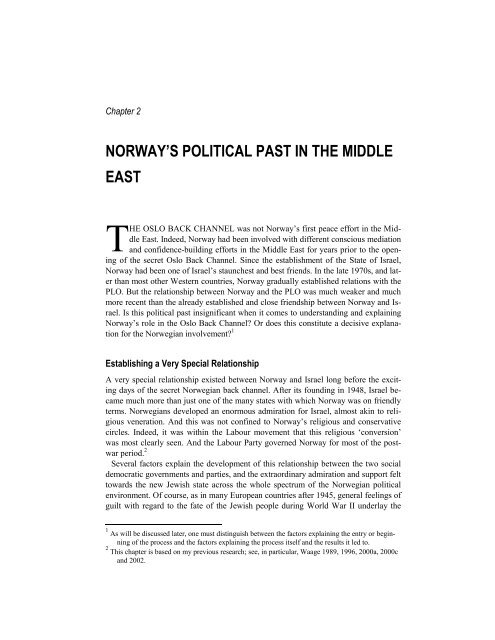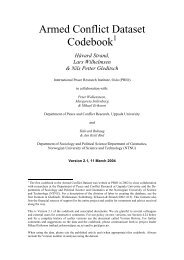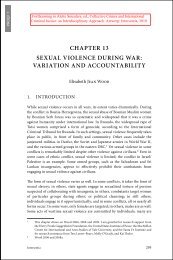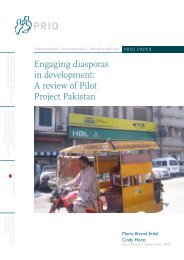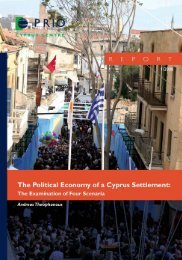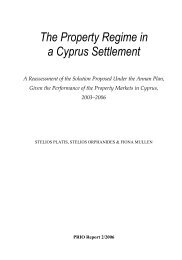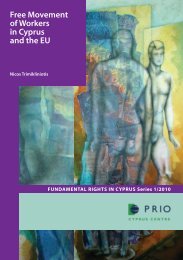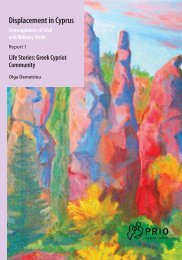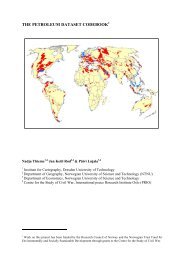- Page 4: Institutt for fredsforskningInterna
- Page 7: PREFACEIN JANUARY 2001, it was agre
- Page 10 and 11: 2 ‘Peacemaking Is a Risky Busines
- Page 12 and 13: 4 ‘Peacemaking Is a Risky Busines
- Page 14 and 15: 6 ‘Peacemaking Is a Risky Busines
- Page 16 and 17: 8 ‘Peacemaking Is a Risky Busines
- Page 18 and 19: 10 ‘Peacemaking Is a Risky Busine
- Page 21 and 22: Chapter 1THE ROAD TO OSLOIDEALLY, M
- Page 23 and 24: The Road to Oslo15Palestinians real
- Page 25 and 26: The Road to Oslo17new Israeli gover
- Page 27 and 28: The Road to Oslo19than ever. The Re
- Page 29 and 30: The Road to Oslo21acceptance of the
- Page 31 and 32: The Road to Oslo23After 1945, the i
- Page 33 and 34: The Road to Oslo25headway. The new
- Page 35 and 36: The Road to Oslo27The Madrid Confer
- Page 37: The Road to Oslo29cial framework of
- Page 41 and 42: Norway’s Political Past in the Mi
- Page 43 and 44: Norway’s Political Past in the Mi
- Page 45 and 46: Norway’s Political Past in the Mi
- Page 47 and 48: Norway’s Political Past in the Mi
- Page 49 and 50: Norway’s Political Past in the Mi
- Page 51 and 52: Norway’s Political Past in the Mi
- Page 53 and 54: Norway’s Political Past in the Mi
- Page 55 and 56: Norway’s Political Past in the Mi
- Page 57: Norway’s Political Past in the Mi
- Page 60 and 61: 52 ‘Peacemaking Is a Risky Busine
- Page 62 and 63: 54 ‘Peacemaking Is a Risky Busine
- Page 64 and 65: 56 ‘Peacemaking Is a Risky Busine
- Page 66 and 67: 58 ‘Peacemaking Is a Risky Busine
- Page 68 and 69: 60 ‘Peacemaking Is a Risky Busine
- Page 70 and 71: 62 ‘Peacemaking Is a Risky Busine
- Page 72 and 73: 64 ‘Peacemaking Is a Risky Busine
- Page 74 and 75: 66 ‘Peacemaking Is a Risky Busine
- Page 76 and 77: 68 ‘Peacemaking Is a Risky Busine
- Page 78 and 79: 70 ‘Peacemaking Is a Risky Busine
- Page 80 and 81: 72 ‘Peacemaking Is a Risky Busine
- Page 82 and 83: 74 ‘Peacemaking Is a Risky Busine
- Page 84 and 85: 76 ‘Peacemaking Is a Risky Busine
- Page 86 and 87: 78 ‘Peacemaking Is a Risky Busine
- Page 88 and 89:
80 ‘Peacemaking Is a Risky Busine
- Page 90 and 91:
82 ‘Peacemaking Is a Risky Busine
- Page 92 and 93:
84 ‘Peacemaking Is a Risky Busine
- Page 94 and 95:
86 ‘Peacemaking Is a Risky Busine
- Page 96 and 97:
88 ‘Peacemaking Is a Risky Busine
- Page 98 and 99:
90 ‘Peacemaking Is a Risky Busine
- Page 100 and 101:
92 ‘Peacemaking Is a Risky Busine
- Page 102 and 103:
94 ‘Peacemaking Is a Risky Busine
- Page 104 and 105:
96 ‘Peacemaking Is a Risky Busine
- Page 106 and 107:
98 ‘Peacemaking Is a Risky Busine
- Page 108 and 109:
100 ‘Peacemaking Is a Risky Busin
- Page 110 and 111:
102 ‘Peacemaking Is a Risky Busin
- Page 112 and 113:
104 ‘Peacemaking Is a Risky Busin
- Page 114 and 115:
106 ‘Peacemaking Is a Risky Busin
- Page 116 and 117:
108 ‘Peacemaking Is a Risky Busin
- Page 118 and 119:
110 ‘Peacemaking Is a Risky Busin
- Page 120 and 121:
112 ‘Peacemaking Is a Risky Busin
- Page 122 and 123:
114 ‘Peacemaking Is a Risky Busin
- Page 124 and 125:
116 ‘Peacemaking Is a Risky Busin
- Page 126 and 127:
118 ‘Peacemaking Is a Risky Busin
- Page 128 and 129:
120 ‘Peacemaking Is a Risky Busin
- Page 130 and 131:
122 ‘Peacemaking Is a Risky Busin
- Page 132 and 133:
124 ‘Peacemaking Is a Risky Busin
- Page 134 and 135:
126 ‘Peacemaking Is a Risky Busin
- Page 136 and 137:
128 ‘Peacemaking Is a Risky Busin
- Page 138 and 139:
130 ‘Peacemaking Is a Risky Busin
- Page 140 and 141:
132 ‘Peacemaking Is a Risky Busin
- Page 142 and 143:
134 ‘Peacemaking Is a Risky Busin
- Page 144 and 145:
136 ‘Peacemaking Is a Risky Busin
- Page 146 and 147:
138 ‘Peacemaking Is a Risky Busin
- Page 148 and 149:
140 ‘Peacemaking Is a Risky Busin
- Page 150 and 151:
142 ‘Peacemaking Is a Risky Busin
- Page 152 and 153:
144 ‘Peacemaking Is a Risky Busin
- Page 154 and 155:
146 ‘Peacemaking Is a Risky Busin
- Page 156 and 157:
148 ‘Peacemaking Is a Risky Busin
- Page 159 and 160:
Chapter 5IMPLEMENTING PEACEWITH THE
- Page 161 and 162:
Implementing Peace153Reactions in I
- Page 163 and 164:
Implementing Peace155Johan Jørgen
- Page 165 and 166:
Implementing Peace157tries. The Osl
- Page 167 and 168:
Implementing Peace159settler fashio
- Page 169 and 170:
Implementing Peace161influence both
- Page 171 and 172:
Implementing Peace163passed among t
- Page 173 and 174:
Implementing Peace165tion would not
- Page 175 and 176:
Implementing Peace167transferred th
- Page 177 and 178:
Implementing Peace169tions, subsect
- Page 179 and 180:
Implementing Peace171rule areas had
- Page 181 and 182:
Implementing Peace173donor programm
- Page 183 and 184:
Implementing Peace175France was gen
- Page 185 and 186:
Implementing Peace177Washington and
- Page 187 and 188:
Implementing Peace179way fielded an
- Page 189 and 190:
Implementing Peace181World Bank mus
- Page 191 and 192:
Implementing Peace183tary force. On
- Page 193 and 194:
Implementing Peace185slowly. The se
- Page 195 and 196:
Implementing Peace187sponsible for
- Page 197 and 198:
Implementing Peace189SWG, Norway wa
- Page 199 and 200:
Implementing Peace191pointed out, a
- Page 201 and 202:
Implementing Peace193issue’ durin
- Page 203 and 204:
Implementing Peace195Israeli judgem
- Page 205 and 206:
Implementing Peace197tween promises
- Page 207 and 208:
Implementing Peace199tinian self-ru
- Page 209 and 210:
Implementing Peace20135% earlier. A
- Page 211 and 212:
Implementing Peace203According to S
- Page 213 and 214:
Implementing Peace205During 1995, t
- Page 215 and 216:
Implementing Peace207Norway did not
- Page 217 and 218:
Implementing Peace209its results sh
- Page 219 and 220:
Implementing Peace211in the Israeli
- Page 221 and 222:
Implementing Peace213pare for the T
- Page 223 and 224:
Implementing Peace215solution to th
- Page 225 and 226:
Implementing Peace217for Jewish set
- Page 227 and 228:
Implementing Peace219the Likud Part
- Page 229 and 230:
CONCLUSIONTHE SIGNING OF THE OSLO A
- Page 231 and 232:
Conclusion223when votes were cast o
- Page 233 and 234:
Conclusion225working with Middle Ea
- Page 235 and 236:
Conclusion227Palestinian ‘insider
- Page 237 and 238:
Conclusion229Back Channel open. Rø
- Page 239 and 240:
Conclusion231the Palestinian demand
- Page 241 and 242:
Conclusion233wegians wanted to be a
- Page 243 and 244:
Conclusion235outside expertise. Whi
- Page 245 and 246:
Conclusion237aim was to build confi
- Page 247 and 248:
Conclusion239we decline the advice
- Page 249 and 250:
Conclusion241Chairing the AHLC expa
- Page 251 and 252:
Conclusion243was intended to suppor
- Page 253 and 254:
Conclusion245small and powerless as
- Page 255 and 256:
SOURCESArchivesMinistry of Foreign
- Page 257 and 258:
BIBLIOGRAPHYAbbas, Mahmoud (Abu Maz
- Page 259 and 260:
Bibliography251of International Soc
- Page 261 and 262:
Bibliography253Kydd, Andrew, 2002.
- Page 263 and 264:
Bibliography255Sullivan, Denis J.,
- Page 265:
Bibliography257‘Partners in Peace


